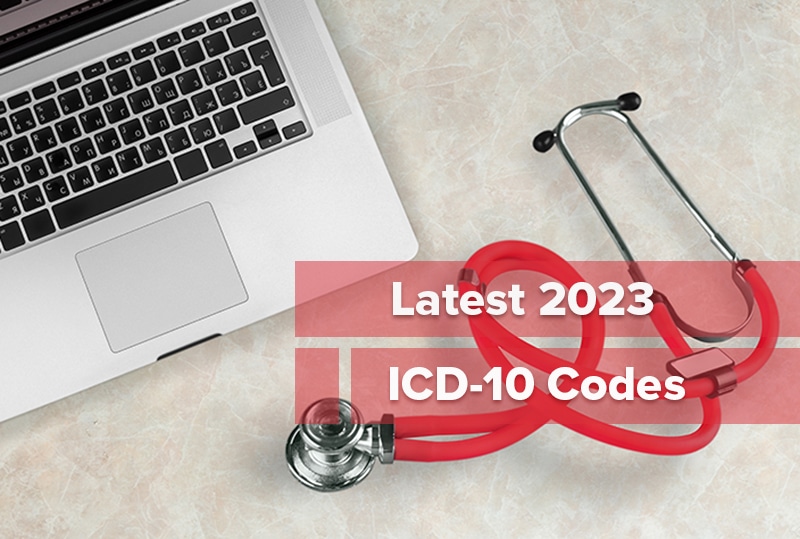This is an update to the blog ICD-10-CM Coding Updates 2022
New ICD-10 codes and ICD-10-PCS codes will come into effect on October 1, 2022. Issued by the Centers for Disease Control and Prevention (CDC) on June 9, 2022, the 2023 ICD-10 code updates include 1,176 new, 28 revised, and 287 deleted codes to be used for patient encounters and discharges till September 30, 2023. As a reliable medical billing and coding company, we stay up to date on coding changes and other industry developments. We discussed the FY 2023 ICD-10-PCS codes and guidelines in a previous post. Here, we look into the latest ICD-10 code the revisions, deletions, and additions for 2023.
Highlights of the 2023 ICD-10-CM Code Changes
- Three New Social Determinants of Health ICD-10 Codes: In 2021, the Centers for Medicare & Medicaid Services (CMS) issued guidance to highlight the significance of social determinants of health (SDOH) – the social, economic, and environmental factors that can affect health outcomes. SDOH can include access to food and transportation, housing security, education, violence, social support, health behaviors, and employment status.
Three new codes have been added to category Z55-Z65 in Chapter 21 Factors influencing health status and contact with health services (Z00-Z99):
Z59.8 Other problems related to housing and economic circumstances
Z59.82 Transportation insecurity (includes excessive transportation time, inaccessible transportation, inadequate transportation, lack of transportation, unaffordable transportation, unreliable transportation and unsafe transportation)
Z59.86 Financial insecurity (includes bankruptcy, burdensome debt, economic strain, financial strain, money problems, running out of money, unable to make ends meet)
Z59.87 Material hardship (includes material deprivation unable to obtain adequate childcare, unable to obtain adequate clothing, unable to obtain adequate utilities, unable to obtain basic needs)
ICD-10 2023 also includes a new Excludes2 note on coding extreme poverty [Z59.5], low income (Z59.6) or material hardship NEC (Z59.87) with Z59.86 and Z59.87.
SDOH can be collected by any member of the patient’s healthcare team including clinicians, social workers, community health workers, case managers, patient navigators, and nurses. SDOH can also be collected at intake through screening tools, person-provider interaction, and individual self-reporting. CMS instructs coders to assign all relevant SDOH Z codes to support quality improvement initiatives.
- New Dementia Codes: Dementia codes have been expanded. Eighty-three new ICD-10 codes were added to Chapter 5 (Mental, Behavioral and Neurodevelopmental disorders [F01-F99]), which includes 69 new codes for dementia with and without psychological symptoms. Here are three new specific dementia codes:
F02.811 dementia in other diseases classified elsewhere, unspecified severity, with agitation
F02.A11 dementia in other diseases classified elsewhere, mild, with agitation
F02.B11 dementia in other diseases classified elsewhere, moderate, with agitation
There are also new guidelines on assigning dementia codes in Chapter 5: Mental, Behavioral and Neurodevelopmental disorders: “The ICD-10-CM classifies dementia (categories F01, F02, and F03) on the basis of the etiology and severity (unspecified, mild, moderate or severe). Selection of the appropriate severity level requires the provider’s clinical judgment and codes should be assigned only on the basis of provider documentation (as defined in the Official Guidelines for Coding and Reporting), unless otherwise instructed by the classification. If the documentation does not provide information about the severity of the dementia, assign the appropriate code for unspecified severity.
If a patient is admitted to an inpatient acute care hospital or other inpatient facility setting with dementia at one severity level and it progresses to a higher severity level, assign one code for the highest severity level reported during the stay.”
The ICD-10 Coordination and Maintenance Committee has also provided clarifications to help determine the dementia stage:
Mild dementia: “Clearly evident functional impact on daily life, affecting mainly instrumental activities. No longer fully independent/requires occasional assistance with daily life activities.”
Moderate dementia: “Extensive functional impact on daily life with impairment in basic activities. No longer independent and requires frequent assistance with daily life activities.”
Severe dementia: “Clinical interview may not be possible. Complete dependency due to severe functional impact on daily life with impairment in basic activities, including basic self-care.”
- New Codes for Injuries to the Head (S00-S09): There are 86 new codes related to head injuries, including new concussion codes. Here are three examples of these concussion codes:
S06.0XAA(Concussion with loss of consciousness status unknown, initial encounter)
S06.0XAD(Concussion with loss of consciousness status unknown, subsequent encounter)
S06.0XAS(Concussion with loss of consciousness status unknown, sequela)
For correct assignment of a concussion code, the documentation should specify when the patient lost consciousness.
- Additions to Diseases of the Circulatory System (I00-I99): Chapter 9 has 43 new codes including:
I20.2(Refractory angina pectoris)
I25.112 (Atherosclerosic heart disease of native coronary artery with refractory anginapectoris)
- New Codes for Meth Overdose: A highly addictive psychostimulant drug, methamphetamine can produce euphoria and stimulant effects. Meth overdose can have dangerous side effects such as agitation, seizures, chest pain, coma, paranoia, heart attack, irregular or stopped heartbeat, difficulty breathing, elevated body temperature, kidney damage/failure, stomach pain and stroke.
In FY 2023, there is a new ICD-10 code category for poisoning by methamphetamines, and also new codes for adverse effects relating to meth use. The following code has been added to Chapter 19 Injury, Poisoning, Consequences of External Cause (S00-T88):
Code T43.65 Poisoning by adverse effect of and underdosing of methamphetamines
According to a new guideline in Chapter 19, coders do not need to see a change in the patient’s condition to assign an underdosing code. The updated guidelines clarify: “Documentation that the patient is taking less of a medication than is prescribed or discontinued the prescribed medication is sufficient for code assignment.”
- Additional Codes for Endometriosis: The endometriosis section of the ICD-10-CM code set has almost 400 new codes representing ob-gyn conditions. The N80 endometriosis codes have been expanded to specify in detail whether the condition is superficial or deep and to also include laterality in sites. New sites added include sigmoid, rectum, and pleura. The following definitions are crucial for selecting the right code:
Superficial endometriosis: Ectopic growth of endometrial-like tissue that extends 5mm or less below the peritoneal surface. Lesions can vary in number (singular or in multiple locations).
Deeply infiltrating endometriosis: Ectopic growth of endometrial-like tissue that extends greater than 5mm below the peritoneal surface. Lesions can vary in number (singular or in multiple locations). These lesions are commonly associated with deep fibrosis and adhesions.
If the physician has not used terms “deep” or “superficial” in the documentation, the coder should look for indication of how far below the peritoneal surface the tissue extended to select the right ICD-10 code.
Other changes: ICD-10 category Z79 long term (current) drug therapy has 15 new codes including including Z79.85 (long-term [current] use of injectable non-insulin antidiabetic drugs). According to a new guideline in Chapter 4 (Endocrine, Nutritional, and Metabolic Diseases):
- If a patient is treated with both insulin and an injectable non-insulin antidiabetic drug, use codes Z79.4 (long-term [current] use of insulin) and Z79.85 (long-term [current] use of injectable non-insulin antidiabetic drugs).
- For a patient treated with bothoral hypoglycemic drugs and an injectable non-insulin antidiabetic drug, assign codes Z79.84 (long-term [current] use of oral hypoglycemic drugs) and Z79.85.
In addition to these changes, there are many new 2023 ICD-10-CM codes impacting every specialty. Leading medical billing and coding service providers are well-prepared to help physicians handle these changes and assign the right codes when billing Medicare, Medicaid, and commercial payers.




